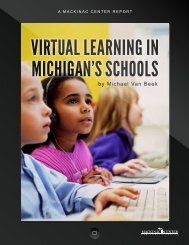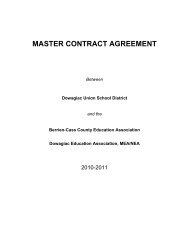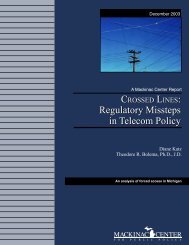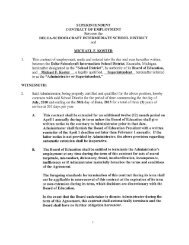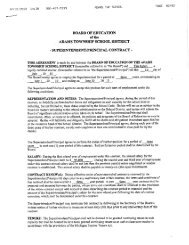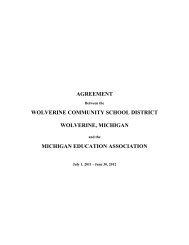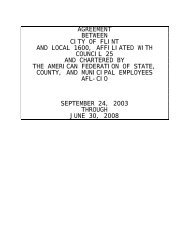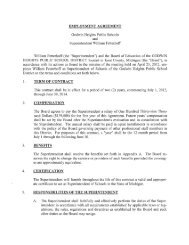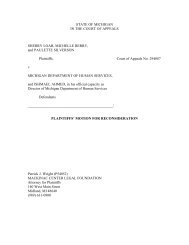The Cost of Remedial Education - Mackinac Center
The Cost of Remedial Education - Mackinac Center
The Cost of Remedial Education - Mackinac Center
You also want an ePaper? Increase the reach of your titles
YUMPU automatically turns print PDFs into web optimized ePapers that Google loves.
<strong>The</strong> <strong>Cost</strong> <strong>of</strong> <strong>Remedial</strong> <strong>Education</strong>:<br />
How Much Michigan Pays When Students Fail to Learn Basic Skills<br />
<strong>Mackinac</strong> <strong>Center</strong> for Public Policy<br />
Appendix I: <strong>Education</strong>al Failure and the Need for<br />
Remediation: <strong>The</strong> Human <strong>Cost</strong><br />
by Thomas F. Bertonneau, Ph.D.<br />
In my capacity as a teacher <strong>of</strong> Michigan college students, both on regular faculty at<br />
Central Michigan University and on a continuing basis as an instructor <strong>of</strong> CMU-administered<br />
extension courses, I have come to suspect that between a third and a half <strong>of</strong> entering<br />
freshmen have considerable difficulty in comprehending an article from a news magazine<br />
such as Time or Newsweek.<br />
<strong>The</strong> students lack knowledge <strong>of</strong> grammar, exhibit poor vocabulary, and have done<br />
little reading beyond assignments in the unchallenging textbooks that constitute the printed<br />
basis <strong>of</strong> their high-school curriculum. <strong>The</strong>y find it extremely difficult to disengage from the<br />
deeply lodged habit <strong>of</strong> relying on personal narrative and subjective opinion in their<br />
confrontation with facts and the world. <strong>The</strong>y react emotionally to problems that can only be<br />
solved intellectually. 36 <strong>The</strong>y struggle to find the right words to articulate intuitions that<br />
remain nebulous and unstated.<br />
When CMU in cooperation with the <strong>Mackinac</strong> <strong>Center</strong> for Public Policy staged a<br />
debate in Mt. Pleasant in April 1997 on the subject <strong>of</strong> declining standards at Michigan public<br />
universities, one CMU faculty member performed the experiment <strong>of</strong> sending the 20 students<br />
from his upper-division humanities course to report on the occasion. He later let me see<br />
these documents, with personal identifications <strong>of</strong> the writers removed. Although the<br />
audience at the event was given much in the way <strong>of</strong> framework—an outline <strong>of</strong> topics to be<br />
addressed and questions to be posed, skillful moderation, spoken summaries by the<br />
participants—the students in question could make little out <strong>of</strong> what they had witnessed.<br />
Asked to reprise the main points <strong>of</strong> contention and sketch the arguments on both sides, they<br />
unanimously failed to do so, falling back instead on random personal observations <strong>of</strong> the<br />
physical setting and tangential expressions <strong>of</strong> their own confusion.<br />
Students lack<br />
knowledge <strong>of</strong><br />
grammar, exhibit<br />
poor vocabulary,<br />
and have done little<br />
reading beyond<br />
assignments in the<br />
unchallenging<br />
textbooks that<br />
constitute the<br />
printed basis <strong>of</strong><br />
their high-school<br />
curriculum.<br />
It therefore should come as no surprise that I endorse the findings <strong>of</strong> Dr. Jay<br />
Greene’s report on the cost <strong>of</strong> remedial education to the Michigan economy. Greene paints a<br />
stark picture <strong>of</strong> the problem in economic terms. Using cautious numbers, he carefully<br />
concludes that educational failure—which is what the large and growing need for remedial<br />
education signifies—is costing Michigan’s economy at least $311 million and perhaps (still<br />
conservatively) as much as $1.15 billion yearly.<br />
36<br />
Walter J. Ong, Jr., Orality and Literacy; <strong>The</strong> Technologization <strong>of</strong> the Word (London: Methuen,<br />
1981). Ong notes that the mental style <strong>of</strong> people who have not assimilated the demands <strong>of</strong> literacy<br />
tends to be egocentric and combative, hence unsuited to subtle analysis or meditation: “Many, if<br />
not all, oral or residually oral cultures strike literates as extraordinarily agonistic in their verbal<br />
performance and indeed in their lifestyle. Writing fosters abstractions that disengage knowledge<br />
from the arena where human beings struggle with one another. It separates the knower from the<br />
known. By keeping knowledge embedded in the human lifeworld, orality situates knowledge<br />
within a context <strong>of</strong> struggle” (pp. 43-44).<br />
September 2000 21



